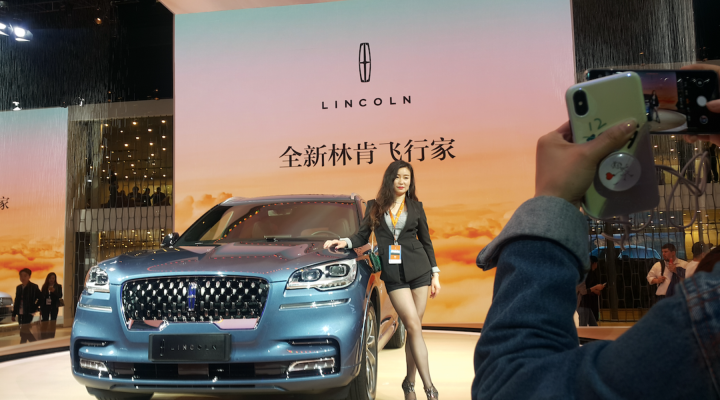
U.S. automakers seek advantage at Shanghai Auto Show

At the Shanghai auto show, carmaker Chevrolet plays a video outlining the history of its SUV, stretching back to 1935. The first model, the Suburban Carryall, was a huge hit, according to the Detroit-based group. Chevrolet hopes to replicate some of that success to offset a nine-month sales decline in China.
The carmaker unveiled two small SUVs at the auto show, both aimed at the young and tech-savvy Chinese consumer. Chevrolet, along with other brands under the General Motors group, counts China as its largest retail market since 2012. Many other foreign auto makers also rely on China to drive growth.
However, sales dipped for the first time in 2018 in 28 years and the market has not recovered. According to the China Association of Automobile Manufacturers, overall vehicle sales in the country for the first quarter of 2019 were 6.4 million, down 11.3% from the same period last year.
Automakers are not selling as many cars in China because the country’s economic slowdown has been steeper than anticipated, thanks in part to the trade tensions with the U.S.; lower consumer confidence; and buyers who may have put off purchasing a car after the government raised sales tax from 7.5% to 10% on small vehicles powered by internal combustion engines.
“In the short term [senior executives from Chinese and foreign automakers are] extremely pessimistic. They’re suffering very serious anxiety,” said Zhang Jinhua of the China Society of Automotive Engineers during a keynote speech at the auto show, after meeting with top car executives.
Michigan-based automaker Ford is struggling more than other foreign brands. The company said its sales in China for the first quarter of this year fell by 35.8%. Its joint venture with a Chinese firm, Changan Ford Automobile, performed even more poorly in the first two months of this year. To turn around its business in China, Ford plans to tailor more products to Chinese consumers.

A Ford car equipped with an artificial intelligence system that helps users do things like search for and watch a good movie using only voice command. The U.S. carmaker says Chinese consumers demand more smart technology to be integrated in vehicles.
Ford’s head of product development for the China market, Tim Slatter, told Marketplace that Chinese buyers care about the car design, smart technology and media content offered in vehicles more than ever before.
“A lot of that is because the local [Chinese manufacturers] have really started to tune into that and deliver. It’s absolutely essential that global players like Ford also do the same thing,” Slatter said. Ford’s SUV model, the Territory, integrates smart technology inside a 10-inch display screen that can be voice-controlled.
“It will recognize many different kinds of Mandarin dialect all across China,” Slatter said. He said the system can open the windows or sunroof, search for a stock price and find the next train from Shanghai to Beijing.
“Chinese consumers are really up-to-date with technology and this feature in this vehicle is really resonating with them. All of our Ford products in China will be connected by the end of 2019,” Slatter said.
Ford has also partnered with Baidu, and uses the Chinese tech firm’s artificial intelligence system to provide information and entertainment in its newest car model, the Focus ST-Line. In a demonstration for Marketplace, the system, called SYNC+, explained that it acts as a personal secretary and can check things like the weather, find the best restaurants or movies.
It allows users to access the popular video streaming platform iQiyi, which is like Netflix. Using only voice command, users can start, stop or skip to the next TV episode.
“[The SYNC+ system] is one of the things, which is going to give us an edge here in China,” said Slatter.

Ford executives pose next to their new models at the Shanghai auto show. The U.S. automaker says it will launch 30 products within the next three years to address a sales slump in China.
Industry officials are uncertain whether the market will turn around in the short term, but there is room for optimism. China’s government is mulling various policies to spur car purchases. Additionally, owning a foreign brand continues to be a status symbol in China.
Luxury vehicles like Mercedes-Benz, Porsches and Bentleys are commonly spotted in wealthy cities like Shanghai. GM, Toyota, Nissan, Honda, Hyundai and Volkswagen, along with their Chinese joint venture partners, supplied 10 of the top 15 best-selling vehicles last year, according to the China Passenger Car Association.
Many Chinese people still haven’t owned their first car yet. The penetration of vehicle ownership is low, according to government statistics. For every 1,000 residents in China in 2018, there were only 172 vehicles, while the U.S. reported more than 800 for the same number in 2014.
There’s a lot happening in the world. Through it all, Marketplace is here for you.
You rely on Marketplace to break down the world’s events and tell you how it affects you in a fact-based, approachable way. We rely on your financial support to keep making that possible.
Your donation today powers the independent journalism that you rely on. For just $5/month, you can help sustain Marketplace so we can keep reporting on the things that matter to you.












